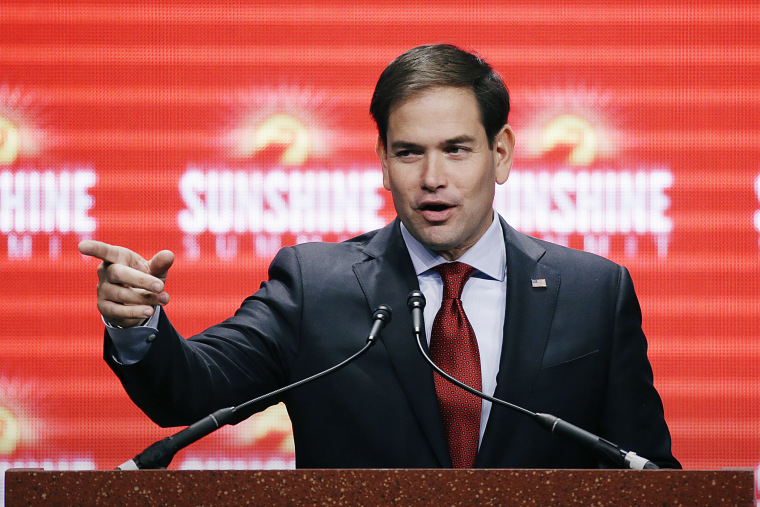During Saturday night's debate for the Democratic presidential candidates, CBS News' John Dickerson posed the one question Republicans often consider the single most important aspect of U.S. national security.
"Secretary Clinton, you mentioned 'radical jihadists,'" the moderator noted. "Marco Rubio, also running for president, said that this attack showed and the attack in Paris showed that we are at war with 'radical Islam.' Do you agree with that characterization, 'radical Islam'?"
Clinton explained that we're "at war with violent extremism," not a major world religion. When Dickerson posed the question to Clinton rivals, Bernie Sanders explained, "I don't think the term is what's important."
For Republicans, however, the issue of word choice is extraordinarily important. During the debate and on each of the Sunday shows, conservatives were practically hysterical in their preoccupation with semantics.
Here's the aforementioned Marco Rubio talking yesterday with ABC's George Stephanopoulos
STEPHANOPOULOS: You saw Secretary Clinton there did not want to use the words “radical Islam,” your response? RUBIO: I think that’s – I don’t understand it. That would be like saying we weren’t at war with Nazis, because we were afraid to offend some Germans who may have been members of the Nazi Party but weren’t violent themselves. We are at war with radical Islam, with an interpretation of Islam by a significant number of people around the world, who they believe now justifies them in killing those who don’t agree with their ideology. This is a clash of civilizations....
First, I have no idea why Rubio would believe a Nazi comparison makes sense in this context. In World War II, the allied powers fought Nazis -- a specific enemy. The senator's frequent confusion about the basics of foreign affairs is alarming, but even Rubio should be able to understand that in 1941, the United States did not go to war against "radicalized Europeans."
The same is true now, whether the Florida lawmaker understands this or not. We're targeting ISIS, not extremist members of a religion with 1.2 billion people, just as we fought Nazis, not European extremists. It's really not that complicated; one need not be a foreign-policy wonk to appreciate the details.
Second, what's especially disappointing with the preoccupation with faith-specific word choice is how tiresome the right's misguided priorities are.
Haven't we been through this enough times for the facts to sink in? Have conservatives seriously convinced themselves that those who use "radical jihadists” will fail to keep them safe, while those who say "radical Muslims" are strategic geniuses? Have Republicans en masse forgotten that it was the Bush/Cheney White House that specifically encouraged American officials to avoid the rhetoric Republicans are now so eager to hear?
In fact, it was. Eight years ago, it was then-President George W. Bush's team that argued, “We ought to avoid the language of religion. Whenever they hear ‘Islamic extremism, Islamic jihad, Islamic fundamentalism,’ they perceive it as a sort of an attack on their faith.”
I can find no instances in which George W. Bush used the phrase "radical Islam." I can also find no instances in which congressional Republicans found that outrageous.
But in 2015, the right has somehow concluded that saying "Islamic terrorism" is a bit like saying "Beetlejuice," only in reverse -- instead of using magic words to make the monster appear, we're apparently supposed to believe using magic words makes the monsters disappear.
If the comparison seems silly, it's simply a reflection of the state of the debate.
Indeed, there's some irony to all of this. When there's a mass shooting in the United States, the right insists that no one use the phrase conservatives don't want to hear ("gun control"). But when there's deadly terrorism, the right insists that everyone use the phrase conservatives do want to hear ("Islamic terrorism").
There's real work to do when it comes to foreign policy, national security, and counter-terrorism. I can appreciate the fact that for some on the right, the partisan id demands a focus on semantics, not public policy, but here's hoping U.S. officials in a decision-making role have the good sense to ignore the misguided noise.
Postscript: For a broader critique of Marco Rubio's mistaken reaction to Paris, Peter Beinart's piece over the weekend in The Atlantic is well worth your time. Of particular interest, note the rebuke over the senator's belief that ISIS is a "civilization."
